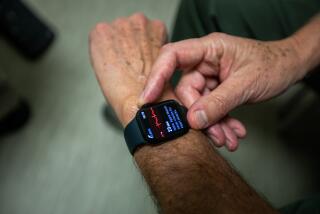Rival of Apple, Armed With Fresh Patent, May Seek IPod Royalties
- Share via
Apple Computer Inc. has reinvented itself around the iPod digital music player, but the innovative computer maker Tuesday faced new questions over whether it’s the mother of its own invention.
Creative Technology said it had been awarded a patent for technology used in the iPod -- which means the rival manufacturer of digital music players might hit Apple up for hefty royalty payments on every iPod sold.
And it’s not the only company that could take a bite out of Apple’s profit.
This month, Apple lost an attempt to patent other parts of the iPod’s technology because archrival Microsoft Corp. had already filed a similar application.
“This is likely not a trivial matter,” said Phil Leigh, president of Inside Digital Media, a St. Petersburg, Fla., consultancy.
Apple declined to comment, but the iPod is central to the firm’s rejuvenation in recent years. Since the iPod debuted in 2001, Cupertino, Calif.-based Apple has sold more than 21 million of the players. And its iTunes Music Store is the most popular legal outlet for online music.
Creative’s patent, awarded Aug. 5, covers the interface that lets users scroll through screens and choose which songs to play, said Craig McHugh, president of Milpitas, Calif.-based Creative Labs, the U.S. unit of Creative, which is based in Singapore.
“We’re openly looking at all of our alternatives,” McHugh said. “A patent protects your intellectual property, and we’d be very open to discussing with other companies who would like to use our user interface in their products or future products.”
Apple’s initial patent application was filed July 30, 2002 -- 17 months after Creative’s first MP3 jukebox went on the market, McHugh said. Microsoft beat Apple to the patent office by five months in 2002.
Neither Microsoft nor Creative has said what, if anything, it plans to do.
But Leigh said it was “a dead certainty that Creative will go after Apple for royalties, or some other type of compensation.”
Whether the company prevails, though, is another matter. Apple would probably fight any attempt by Creative to collect and, Leigh said, “the applicability of patents can be difficult to prove. It is not unusual for reasonable judges to disagree upon the applicability of a patent.”
Even as it faces questions about the iPod’s provenance, Apple is trying to stretch the players’ popularity with new features. Next week, for instance, Apple is expected to unveil its long-awaited iTunes phone, developed with Motorola Inc., as a device for Cingular Wireless.
“It’s good news for Apple and Motorola because it confirms that they did find someone” to be a wireless partner, said Dario Betti, an analyst with telecom research firm Ovum, who said he learned of the phone’s debut from industry sources.
Motorola had planned to unveil the phone this year, but scrubbed the launch because no wireless carrier had agreed to sell the device, which allows users to play songs.
“It’s been a long time because a buyer did not go for it as much as Apple had expected,” Betti said. “It’s an important move, but we need more [partners] to see if validation of the business market is working.”
Representatives of Cingular, Motorola and Apple declined to comment.
Apple shares rose 73 cents Tuesday to $46.57.





